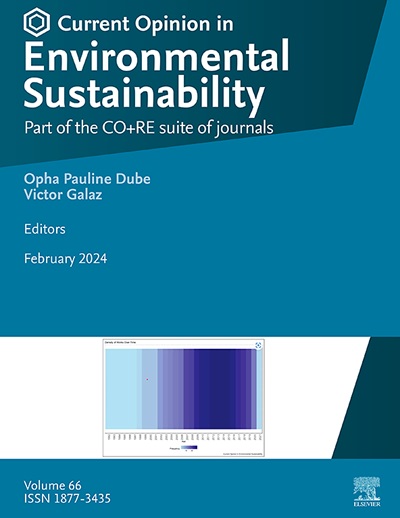The need for transnational networks and transdisciplinary education for sustainable development in UNESCO Biosphere Reserves in the Global South
IF 6.3
2区 环境科学与生态学
Q1 ENVIRONMENTAL SCIENCES
Current Opinion in Environmental Sustainability
Pub Date : 2025-07-04
DOI:10.1016/j.cosust.2025.101553
引用次数: 0
Abstract
As learning sites for sustainable development, United Nations Educational, Scientific, and Cultural Organization (UNESCO) Biosphere Reserves (BRs) are unique sites that promote human–nature interactions in biodiversity conservation. BRs are part of a World Network of BRs, which provide opportunities for transnational collaborations. With the 50th anniversary of UNESCO’s Man and Biosphere Programme, we systematically analyzed literature on BRs in the Global South and assessed whether transnational connections emerged from the network especially in fulfilling the shared goal of being learning sites for sustainable development. We found little evidence of transnational networking between BRs in the Global South. While there are nonformal environmental education initiatives in BRs, there is a lack of reported transdisciplinary approaches and formal education about BRs in BRs. Furthermore, Indigenous and local knowledge (ILK) is rarely integrated into initiatives. Equitable and inclusive partnerships, integration of ILK, and co-production of knowledge could be enabling factors for transdisciplinary education.
在教科文组织全球南方生物圈保护区建立可持续发展的跨国网络和跨学科教育的必要性
作为可持续发展的学习场所,联合国教科文组织(UNESCO)生物圈保护区(BRs)是促进生物多样性保护中人与自然互动的独特场所。br是br世界网络的一部分,它为跨国合作提供了机会。在联合国教科文组织“人与生物圈计划”50周年之际,我们系统地分析了有关全球南方地区BRs的文献,并评估了跨国联系是否从网络中产生,特别是在实现成为可持续发展学习地点的共同目标方面。我们发现很少有证据表明全球南方地区的商业银行之间存在跨国网络。虽然在农村有非正式的环境教育举措,但在农村缺乏跨学科的方法和关于农村环境教育的正式教育。此外,土著和地方知识(ILK)很少被纳入倡议。公平和包容的伙伴关系、ILK的整合以及知识的共同生产可以成为跨学科教育的有利因素。
本文章由计算机程序翻译,如有差异,请以英文原文为准。
求助全文
约1分钟内获得全文
求助全文
来源期刊

Current Opinion in Environmental Sustainability
ENVIRONMENTAL SCIENCES-ENVIRONMENTAL SCIENCES
CiteScore
13.80
自引率
2.80%
发文量
52
审稿时长
6-12 weeks
期刊介绍:
"Current Opinion in Environmental Sustainability (COSUST)" is a distinguished journal within Elsevier's esteemed scientific publishing portfolio, known for its dedication to high-quality, reproducible research. Launched in 2010, COSUST is a part of the Current Opinion and Research (CO+RE) suite, which is recognized for its editorial excellence and global impact. The journal specializes in peer-reviewed, concise, and timely short reviews that provide a synthesis of recent literature, emerging topics, innovations, and perspectives in the field of environmental sustainability.
 求助内容:
求助内容: 应助结果提醒方式:
应助结果提醒方式:


